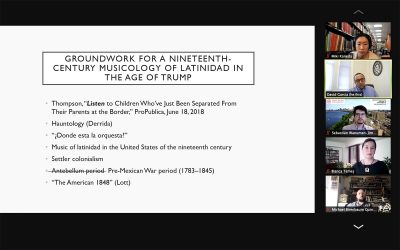The sounds of weeping children forced to separate from their parents in U.S. detention centers is a noise music scholar David Garcia of the University of North Carolina at Chapel Hill analyzed in his current research as an ethnomusicology scholar.

The Graduate Music Society hosted Garcia Thursday for their event — named after Garcia’s paper — “‘Where’s the Orchestra?’: A Reckoning for a Nineteenth Century Musicology of Latinidad in the Age of Trump” as part of BU’s Spring Zoom Colloquium Series.
Garcia, who is also the chair of the department of music at UNC, has a Ph.D. in ethnomusicology — the study of different regions’ music as a social agent in various cultural contexts.
At the event, he specifically discussed his analysis of an audio recording released by ProPublica in which a border patrol agent is heard analogizing crying children to an orchestra with no conductor. This audio, which has been described as “heartbreaking,” represents a continuation of a larger historical trend, he said.
“The agent’s rhetorical use of music, analogizing the sounds of crying children to a conductorless orchestra, is a poignant reminder of the insidious uses of music and spaces of detainment,” said Garcia at the talk. “Most recently, the United States’ War on Terror.”
This specific project — which uses the sound bite as the basis for establishing a clearer understanding of historical white supremacy and settler-colonialism in the United States — was first sparked from the “xenophobic and racist nature” of the President Donald Trump’s rhetoric and “worldview,” he said at the event.
“That election, and his ascendancy as president, very much made this project urgent for me,” Garcia said. “I felt that I could frame the research project not simply as from 1783 to 1900, but a project that could help at least me and others to understand better what was going on in our lives.”
In an interview with Sebastián Wanumen Jimenez, a third year Ph.D. student in the department of musicology and ethnomusicology at BU and the president of BU’s Graduate Music Society, said the society considers “the relevancy of the topics” when choosing colloquium speakers.
Wanumen Jimenez said Garcia’s talk was personally interesting to him because it aligned with his own research.
“I knew about his work, about his books, but I hadn’t talked to him before,” he said. “This was a good opportunity for me to connect with him.”
Another important consideration in finding speakers, Wanumen Jimenez said, was representation, adding that the society strives to make the topics as diverse as possible.
In an interview, Garcia said as the son of immigrants, his parents — who “worked their way up” in the country — taught him to value education and work hard. In his current studies, he is specifically interested in how race and music intersect.
“What it really comes down to is focusing on the issues that are of most interest to me, which is the connection between music and race,” he said, “and how racialized discourses unfold within the context of music and sound.”
At the event, Garcia explained how the ProPublica audio recording relates to a larger pattern in history.
“The recorded sound of the crying children and the Spanish speaking U.S. border agent evoke a 19th century Latinidad conflicted,” he said, “in number one, its complicity in genocidal subtle settler colonialism and number two, its resistance to white supremacy’s project of Manifest Destiny.”
Throughout Thursday’s discussion, Garcia weaved in a back and forth narrative between historical and modern examples of white supremacy.
“I trace the threat to whiteness that dates much earlier than recent U.S. music and race theory scholarship has proposed,” Garcia said.
During the talk, a 2020 NowThis News viral video was presented of a white woman who was angered over Spanish music being played in a public park to illustrate modern-day racism.
Garcia’s talk on examining the ProPublica audio recording and its relation to the history of white supremacy’s pervasiveness summarizes important parts of American history, he said at the event. He concluded his talk by highlighting that white nationalism lives on, and the Latinx community must make progress to break the cycle.
“What we hear in the cries of those children should not merely resound with their humanity, but their humanity denied by white supremacy framed in a seemingly innocuous allusion to music,” he said. “We hear an oral reckoning most importantly for Latinx musicology in the age of Trumpism that also holds Latinidad that accountable to its own histories of inflicting trauma and pain.”
Wanumen Jimenez said Garcia’s talk offers a greater perspective on history’s influence on music and he encourages people to think critically about the intersection between the two.
“We need to think about music and sound critically,” Wanumen Jimenez said. “It is fully loaded with tons of cultural background, and that background could be sexist, could be racist. So, what we’re trying to do with this colloquium is to think critically about music and also disseminate the work that we do.”






















































































































